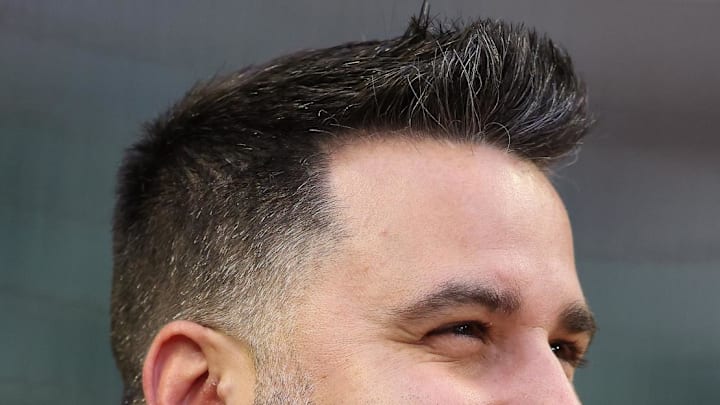Alex Anthopoulos front office WAA impact for Atlanta Braves: +5.6 games. Rank in MLB: 7. Rank in division: 2.
Since the conclusion of the 2022 postseason, Braves general manager Alex Anthopoulos brought a hefty 17 players to Atlanta in trades, waiver claims or cash purchases with other teams. That represents one of the most frenetic trade patterns in MLB.
Yet from a statistical standpoint, far and away the most productive thing Anthopoulos did concerned players who were already inside the Braves sphere. Four such decisions in particular stand out, and those four constitute the bulk of the reason why the Braves front office’s 2023 season was such a success.
First, he locked up third baseman and mid-order slugger Austin Riley for 10 seasons in a $212 million deal. Riley returned the favor with 37 home runs, 97 RBI, an .861 OPS and +3.7 Wins Above Average.
Second, he extended pitching phenom Spencer Strider through 2028 for $75 million. Strider returned that favor with a 20-5 record, a 3.86 ERA in 186 innings, 281 strikeouts and a 1.8 WAA.
Third, he extended young outfielder Michael Harris through 2030 at a total tab of $72 million. Harris justified that faith with a .293 average, an .808 OPS, and 1.7 WAA.
Fourth, he re-signed veteran pitcher Charlie Morton for the year and 30 starts with a perfectly functional 3.64 ERA. Morton was worth another +1.7 WAA.
WAA is used in this series of front office evaluations because it is a zero-based version of WAR, therefore enabling valid approximations of impact against wins and losses.
GMs often focus on the improvement of their team via external sources. Anthopoulos certainly did that, as witnessed by those 17 trade arrivals. Yet the net impact of all 17 of those trade acquisitions on the fate of the 2023 Braves only amounted to +0.8 games as measured by WAA. The net impact of the four extensions to players already in-house handed out by Anthopoulos alone amounted to +8.9 games.
The basic building block for improving your talent base (this goes for baseball, football, engineering, accounting or any other profession) begins with retaining the talent you already have.
By adding Riley, Harris and Strider to in-house players already under long-term contract (notably Ronald Acuna and Ozzie Albies), Anthopoulos not only secured the Braves’ 2023 success, but probably enhanced their profile in the years to come.
Overall, the Anthopoulos front office made 44 personnel moves impacting a major league roster since the conclusion of the 2022 post-season. Seventeen of those moves helped the Braves, 22 were negative, and five had neutral value.
Here’s the full short-term and long-term statistical profile on the 2023 performance of the Anthopoulos front office. Again, all figures reflect group Wins Above Average.
Acquired by trade, waiver claim or purchase:
- Since October 2022, 16 players, +0.8 net impact
- Prior to October 2022, 6 players, +5.5 net impact
Signed as a free agent or extended for multiple seasons:
- Since October 2022, 10 players, +9.5 net impact
- Prior to October 2022, 9 players, +8.7 net impact
System products:
- Since October 2022, 7 players, -1.9 net impact
- Prior to October 2022, 6 players, +1.2 net impact
Traded away, waived, sold, released or lost to free agency
- Since October 2022, 12 players, -2.6 net impact
- Prior to October 2022, 19 players, -1.3 net impact
A few words about that profusion of trades. A handful were noteworthy, none more so than the December three-team trade with Oakland and Milwaukee that landed catcher Sean Murphy in Atlanta. Murphy’s .251 average didn’t do much, but his plus defense still made him a +2.5 WAA backstop.
Most of those deals unfolded in an ongoing search for bullpen support. Because relievers are so notoriously unreliable from season to season, it’s often a quixotic search, and that certainly was the case for Anthopoulos in 2023.
Of the 16 players Anthopoulos imported from other rosters this season, nine were relievers. Yet they only averaged about 20 innings apiece, only one (Joe Jimenez) worked more than 35 innings, and their net WAA amounted to -2.4 games.
So the search for the missing bullpen link occupied Anthopoulos rather incessantly but to little fruitful gain.
Atlanta’s farm system, in recent seasons a talent bonanza, didn’t yield much of value in 2023. Seven first-year players got a shot, but their net impact amounted to -1.9 WAA. That’s not uncommon for rookies, but it’s also not productive, which is why some GMs are so suspicious about farm system talent.
Moreover, five of the seven also worked out of the bullpen, meaning the Braves farm system in 2023 functioned largely as an extension of that quixotic search for relief help.
The principal exception in that respect was starter Jared Shuster. Making the team out of spring camp, Shuster had an up-and-down season (heavy on the downs) that included 11 big league starts encompassing 52 innings with a 5.81 ERA and -0.6 WAA.
